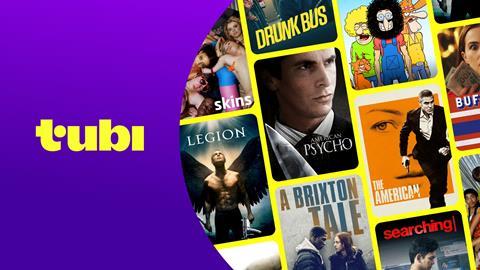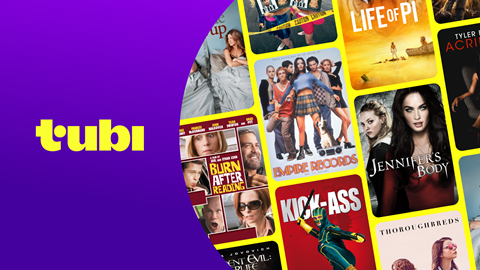Boasting 80 million active monthly users and 2.1% of total TV time in the US, David Salmon, EVP and MD of International at AVOD Tubi explains how the company has found success through an extensive, yet diverse library. George Jarrett reports.
David Salmon was with Endeavour as CTO focussing mainly on live sports, and then the video shopping specialist Bambuser as Chief Product and Technology Officer, so did he carry over his technical operational knowledge of streaming into his role at the Fox-owned, ad-supported free streaming service (AVOD) Tubi?

“I did run the engineering sides previously, and I think it is extremely applicable to the work I do at Tubi because we are talking about launching free streaming services and grappling with the way that streaming is fundamentally disrupting traditional distribution,” he says.
“A big part of my role has been getting us lined up for the UK launch at the start of July (2024). Tubi is an owned and operated product, so my background has been useful,” he adds. “There has been an awful lot to learn both in terms of understanding the brand and the way the business operates. You know how it’s been able to build such tremendous momentum in North Americas, and try to take all those lessons as we look to expand across Europe, and potentially farther afield.”
Read more Fox launches Tubi in the UK
Salmon is responsible for all of the Tubi international markets – in Canada, Australia, New Zealand, Latin America, and now the UK. The learning process is what any good and interesting role should be.
“In each of those markets, whilst the product offering at its core is the same in terms of platform and product features, the marketing approach, and the way we even position the brand is different per market – whether it is the advertising ecosystem, or how we think about our competitors in each market. This aspect is very varied.
“It has been incredibly interesting trying to deal with the breadth of challenges: these international roles tend to force you to lean into all of the differences,” he adds.
Salmon perpetually sees public service broadcasters moving away from linear, and with this in mind, he believed the UK market required a specific business plan.
“It was very clear that one of the big realities of the UK market was its streaming landscape. Whether it is the BBC iPlayer, launched all the way back in 2006 and a big pioneer in the streaming space in general, or the amazing work ITV has done with ITVX, or the base that All4 has been able to build. BBC iPlayer slightly defined the category in really interesting ways.
“We come into contact with these guys a lot, and they are big players in the UK media ecosystem,” he continues. “We know that a big part of our job to be successful there is helping define ourselves alongside these other free services. When Tubi launched in the US (2014), free streaming itself was a big hook, but free streaming has been around in the UK for much longer so we knew we had to be more distinct, and counter position against these very large mainstream services.”
Drag queens and vampires
“From the moment you land on our platform we are going through this real-time personalisation to make sure we can find those deep interests in related titles” David Salmon, Tubi]
Whilst Tubi started producing its own content in 2021, it will not produce fresh productions shot in the UK for some time. But its local service will mix movies and TV series from its 250 partner/providers with its own original content.

“When it comes to actually commissioning originals for the UK, we want to learn more about what our users want from us. We do have a number of originals produced for the North American market already available on the UK service, and we will continue to release more over the next year,” says Salmon.
“Good examples of the shows doing well are the horror/comedy movie Slay, about drag queens and vampires, and the 10-episode series House of Heat, in which adult content creators move into a house to help grow each other’s fan base,” he adds.
Finding more hits will be supported by content from all the major studio partners Tubi can boast of. “When we launched in the UK, we announced content deals and partnerships with Disney, NBC Universal, and Lionsgate,” explains Salmon. “On the TV side, Banijay is one of our major partners, and All3Media is another. A lot of the very large partners we work with across North America are also partnered with us as we enter the UK market.”
Tubi is famed for deploying 720p in the US, so what did it do technically for the UK? “We have the same content renditions that are available in the US in terms of the encoding and transcoding pipeline. We use HEVC across all of the big screens, so the picture quality is fabulous,” says Salmon. “Right now, we do have an AI service in the US, which is a platform feature called Rabbit-AI, which leverages ChatGPT to provide content recommendations, but it is still quite early in the process of testing and understanding how users react to it.”
Before Rabbit-AI arrives in Europe, all content personalisation is built on top of machine learning that Tubi has been building out for the past decade.
“We have a very large engineering team headquartered over in San Francisco, and all of these guys just breathe content discovery. So, from the moment you land on our platform we are going through this real-time personalisation to make sure we can find those deep interests in related titles, and really bring people into what we refer to in the US as content rabbit holes,” he says.
Asked what impressions and experiences he wants to share with the IBC panel audience, Salmon observes: “Tubi obviously sits in a very interesting and relatively new category. AVOD has lots of similarities with what you would see with the commercial broadcasters and the PSBs in the UK market, but it is its own distinct category, and we are slightly less defined, for example by a broadcast window.
“The hope is going to be to share some of the lessons that we have learnt around content catalogue sizes, deep content discovery, and not being bound by the constraints of traditional linear,” he adds.
Read more IBC Conference: Collaborating for the future of public service broadcast
Unbundling linear networks
“There is an increasing number of consumers who just don’t have any connection with linear TV” David Salmon, Tubi]
The panel theme of ‘Innovating broadcast operating business models’, has three core subject areas: the disruption of long-established linear business models; how content providers can innovate even with audiences proving difficult; and where should PSM organisations focus.
On the first one, Salmon comments: “It feels like a trend that people have been seeing and expecting for the past decade, in terms of the unbundling of linear networks. There is an increasing number of consumers who just don’t have any connection with linear TV. Tubi has never been attached to linear in any way, and we have always been direct-to-consumer.
“We now have 2.1% of total TV time in the US, and that has no bearing against the legacy of linear TV. Whilst the changes have been expected for some time, it does feel like they are accelerating,” he says.
On the second subject, Salmon references key points about the wider market: “One of the things Tubi has been incredibly successful at doing is broadening the content offering beyond just programming for that core mainstream user. There is a risk with a lot of BVOD and SVOD services because they have fairly small catalogues. Some of those PSB BVOD services are still tied to that kind of broadcasting programming approach.
“That means they tend to drive towards a median viewer, as audiences get more diverse,” he says.
On the SVOD competition, Salmon has seen the hugely followed directional change of plugging in an ad tier, increased costs for consumers who wish to opt-out, and the prospect of reduced subscriptions combined with advertising to create a new revenue mix.
“Over the past seven or eight years there has been a large number of SVOD services launched” he says. “A vast majority of major media companies have tried to go direct to the consumer, whether or not it is sustainable.”
So much momentum
Identifying continued price increases and reductions in spending on original content to rationalise cost bases, the proliferation of SVOD services is, “something the whole industry is going to be watching for,” according to Salmon.

The AVOD message from Tubi is, “We are giving you more for free, rather than giving you less for more, and a lot of the time that is why we are able to build so much momentum in our markets.”
On the third topic of the panel session, Salmon re-iterated his tough message for PSBs. “There is a risk that if they keep programming for that median viewer on their linear networks, they won’t capture the next-generation streamers on their digital properties. Our secret source is probably more about the breadth of our library and the diversity – brilliant premium content that’s totally free.
“As for what I want to see at the IBC show, it is an amazing opportunity to check what is happening in lots of diverse European markets. Bringing them all together is always illuminating.”
Hear more from David Salmon and his fellow panellists in the session ‘Where next? Innovating broadcast operating business models’ at IBC2024 on 13th Sept.
Read more IBC Conference: Hollywood heavyweights edge closer to seamless IP production ecosystem
























No comments yet